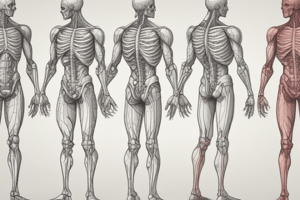Podcast
Questions and Answers
What is the frontal bone?
What is the frontal bone?
Forehead bone
What is the zygomatic bone?
What is the zygomatic bone?
Cheekbone
What is the mandible?
What is the mandible?
Lower jaw
What is the nasal bone?
What is the nasal bone?
What are the palatine bones?
What are the palatine bones?
What does the parietal bone form?
What does the parietal bone form?
What is the occipital bone?
What is the occipital bone?
Describe the sphenoid bone.
Describe the sphenoid bone.
What is the lacrimal bone?
What is the lacrimal bone?
What is the maxilla?
What is the maxilla?
What does the ethmoid bone do?
What does the ethmoid bone do?
Where is the site of the mastoid process?
Where is the site of the mastoid process?
What is the sella turcica?
What is the sella turcica?
What is the cribriform plate?
What is the cribriform plate?
Where is the mental foramen located?
Where is the mental foramen located?
Which bones are the site of styloid processes? (Select all that apply)
Which bones are the site of styloid processes? (Select all that apply)
How many bones contain paranasal sinuses?
How many bones contain paranasal sinuses?
What are the occipital condyles?
What are the occipital condyles?
Where is the foramen magnum found?
Where is the foramen magnum found?
What is the hyoid bone?
What is the hyoid bone?
What is found in the middle ear?
What is found in the middle ear?
Which bones comprise the nasal septum? (Select all that apply)
Which bones comprise the nasal septum? (Select all that apply)
What is the crista galli?
What is the crista galli?
Which bones contain alveoli bearing teeth? (Select all that apply)
Which bones contain alveoli bearing teeth? (Select all that apply)
Which bones are connected by the lambdoid suture? (Select all that apply)
Which bones are connected by the lambdoid suture? (Select all that apply)
Which bones are connected by the squamous suture? (Select all that apply)
Which bones are connected by the squamous suture? (Select all that apply)
Flashcards
Frontal Bone
Frontal Bone
Forms the forehead region and protects the brain.
Zygomatic Bone
Zygomatic Bone
Forms the cheekbone, providing facial structure and support.
Mandible
Mandible
The lower jaw bone; the only movable bone of the skull, used for chewing.
Nasal Bone
Nasal Bone
Signup and view all the flashcards
Palatine Bone
Palatine Bone
Signup and view all the flashcards
Parietal Bone
Parietal Bone
Signup and view all the flashcards
Occipital Bone
Occipital Bone
Signup and view all the flashcards
Sphenoid Bone
Sphenoid Bone
Signup and view all the flashcards
Lacrimal Bone
Lacrimal Bone
Signup and view all the flashcards
Maxilla
Maxilla
Signup and view all the flashcards
Ethmoid Bone
Ethmoid Bone
Signup and view all the flashcards
Mastoid Process
Mastoid Process
Signup and view all the flashcards
Alveoli
Alveoli
Signup and view all the flashcards
Nasal Septum
Nasal Septum
Signup and view all the flashcards
Foramen Magnum
Foramen Magnum
Signup and view all the flashcards
Condyles
Condyles
Signup and view all the flashcards
Lambdoid Suture
Lambdoid Suture
Signup and view all the flashcards
Squamous Suture
Squamous Suture
Signup and view all the flashcards
Hyoid Bone
Hyoid Bone
Signup and view all the flashcards
Middle Ear
Middle Ear
Signup and view all the flashcards
Paranasal Sinuses
Paranasal Sinuses
Signup and view all the flashcards
Study Notes
Axial Skeleton Overview
- The axial skeleton consists of bones that form the central axis of the body, including the skull, vertebral column, and rib cage.
Key Bones of the Skull
- Frontal Bone: Forms the forehead region, contributing to the protection of the brain.
- Zygomatic Bone: Known as the cheekbone, it provides facial structure and support.
- Mandible: The lower jaw bone; the only movable bone of the skull responsible for chewing.
- Nasal Bone: Composes the bridge of the nose, supporting the structure of the nasal cavity.
- Palatine Bone: Forms the posterior section of the hard palate, crucial for the separation of oral and nasal cavities.
- Parietal Bone: Covers much of the lateral and superior sections of the cranium, providing structural strength.
- Occipital Bone: The most posterior part of the skull; contains vital openings for the spinal cord.
- Sphenoid Bone: A unique, bat-shaped bone part of the cranial floor, significance includes housing the sella turcica, which holds the pituitary gland.
- Lacrimal Bone: Small bones in the medial wall of each orbit that house the tear ducts.
- Maxilla: Forms the upper jaw and central part of the hard palate.
- Ethmoid Bone: Contributes to the nasal structure with superior and medial nasal conchae; includes the cribriform plate and crista galli for olfactory function.
Structures and Functions within the Skull
- Mastoid Process: Located on the temporal bone; serves as an attachment point for neck muscles.
- Alveoli: The maxilla and mandible contain these sockets for teeth.
- Nasal Septum: Comprised of the vomer and ethmoid bones, it divides the nasal cavity.
- Foramen Magnum: An opening in the occipital bone, allowing for the spinal cord to connect with the brain.
- Condyles: On the occipital bone, these articulate with the atlas (the first cervical vertebra), allowing head movement.
Sutures Connecting Skull Bones
- Lambdoid Suture: Connects the occipital bone with the parietal bones.
- Squamous Suture: Joins the temporal bones with the parietal bones.
Miscellaneous
- Hyoid Bone: A U-shaped bone in the neck that provides attachment for tongue muscles.
- Middle Ear: Located within the temporal bone, it is essential for hearing.
- Paranasal Sinuses: The sphenoid bone houses four sinuses that help with respiratory function.
Studying That Suits You
Use AI to generate personalized quizzes and flashcards to suit your learning preferences.




